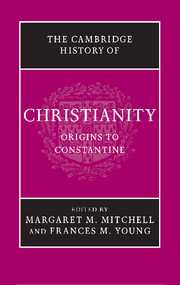Book contents
- Frontmatter
- Prelude: Jesus Christ, foundation of Christianity
- Part I The Political, Social and Religious Setting
- Part II The Jesus Movements
- 4 Jewish Christianity
- 5 Gentile Christianity
- 6 Johannine Christianity
- 7 Social and ecclesial life of the earliest Christians
- Part III Community Traditions and Self-Definition
- Part IV Regional Varieties of Christianity in the First Three Centuries
- Part V The Shaping of Christian Theology
- Part VI ‘Aliens’ become Citizens: towards Imperial Patronage
- Conclusion: retrospect and prospect
- Bibliographies
- Index
- Map 1. The Roman Empire in the time of Marcus Aurelius
- References
4 - Jewish Christianity
from Part II - The Jesus Movements
Published online by Cambridge University Press: 28 March 2008
- Frontmatter
- Prelude: Jesus Christ, foundation of Christianity
- Part I The Political, Social and Religious Setting
- Part II The Jesus Movements
- 4 Jewish Christianity
- 5 Gentile Christianity
- 6 Johannine Christianity
- 7 Social and ecclesial life of the earliest Christians
- Part III Community Traditions and Self-Definition
- Part IV Regional Varieties of Christianity in the First Three Centuries
- Part V The Shaping of Christian Theology
- Part VI ‘Aliens’ become Citizens: towards Imperial Patronage
- Conclusion: retrospect and prospect
- Bibliographies
- Index
- Map 1. The Roman Empire in the time of Marcus Aurelius
- References
Summary
Jesus and the earliest church
To some readers, the title of this chapter may seem like a contradiction in terms, since ‘Judaism’ and ‘Christianity’ are generally perceived to be opposites. But ‘from the beginning it was not so’ (Matt 19:8); Jesus and his first disciples were Jews, and for several centuries after his death Christians of Jewish origin were a significant presence both inside and outside of the land of his birth.
His own legacy, to be sure, was ambiguous; he was remembered, for example, as having claimed that it was not what entered people’s mouths that defiled them but what came out of their mouths (Mark 7:15; Matt 15:11; Gos. Thom. 14). If taken literally, this principle would suggest that foods have no power to defile, a conclusion flatly contradicting the Old Testament kosher regulations (Lev 11). It has been argued, however, that Jesus’ saying employs a Semitic idiom in which ‘not this but that’ actually means ‘not so much this as that’. Although Mark 7:19 interprets the saying as an assertion that all foods may be consumed, that is Mark’s exegesis not Jesus’, and it is omitted in the Matthean parallel (Matt 15:17). If Jesus had made an unambiguous statement abrogating the Old Testament kosher laws, these scholars say, those within the later church who claimed that Christians were free to eat anything probably would have invoked it to end discussion – but they did not.
Keywords
- Type
- Chapter
- Information
- The Cambridge History of Christianity , pp. 85 - 102Publisher: Cambridge University PressPrint publication year: 2006
References
- 1
- Cited by

